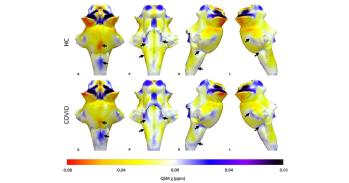
Urban neighbourhoods with high deprivation, population density and inequality found to have higher rates of schizophrenia.
Urban neighbourhoods with high deprivation, population density and inequality found to have higher rates of schizophrenia.
Our data seems to suggest that both absolute and relative levels of deprivation predict the incidence of schizophrenia.
James Kirkbride
Higher rates of schizophrenia in urban areas can be attributed to increased deprivation, increased population density and an increase in inequality within a neighbourhood, new research reveals. The research, led by the University of Cambridge in collaboration with Queen Mary University of London, was published today in the journal Schizophrenia Bulletin.
Dr James Kirkbride, lead author of the study from the University of Cambridge, said: “Although we already know that schizophrenia tends to be elevated in more urban communities, it was unclear why. Our research suggests that more densely populated, more deprived and less equal communities experience higher rates of schizophrenia and other similar disorders. This is important because other research has shown that many health and social outcomes also tend to be optimal when societies are more equal.”
The scientists used data from a large population-based incidence study (the East London first-episode psychosis study directed by Professor Jeremy Coid at the East London NHS Foundation Trust and Queen Mary, University of London) conducted in three neighbouring inner city, ethnically diverse boroughs in East London: City & Hackney, Newham, and Tower Hamlets.
427 people aged 18-64 years old were included in the study, all of whom experienced a first episode of psychotic disorder in East London between 1996 and 2000. The researchers assessed their social environment through measures of the neighbourhood in which they lived at the time they first presented to mental health services because of a psychotic disorder. Using the 2001 census, they estimated the population aged 18-64 years old in each neighbourhood, and then compared the incidence rate between neighbourhoods.
The incidence of schizophrenia (and other similar disorders where hallucinations and delusions are the dominant feature) still showed variation between neighbourhoods after taking into account age, sex, ethnicity and social class. Three environmental factors predicted risk of schizophrenia – increased deprivation (which includes employment, income, education and crime) increased population density, and an increase in inequality (the gap between the rich and poor).
Results from the study suggested that a percentage point increase in either neighbourhood inequality or deprivation was associated with an increase in the incidence of schizophrenia and other similar disorders of around 4%.
Dr Kirkbride added: “Our research adds to a wider and growing body of evidence that inequality seems to be important in affecting many health outcomes, now possibly including serious mental illness. Our data seems to suggest that both absolute and relative levels of deprivation predict the incidence of schizophrenia.
“East London has changed substantially over recent years, not least because of the Olympic regeneration. It would be interesting to repeat this work in the region to see if the same patterns were found.”
The study also found that risk of schizophrenia in some migrant groups might depend on the ethnic composition of their neighbourhood. For black African people, the study found that rates tended to be lower in neighbourhoods where there were a greater proportion of other people of the same background. By contrast, rates of schizophrenia were lower for the black Caribbean group when they lived in more ethnically-integrated neighbourhoods. These findings support the possibility that the socio-cultural composition of our environment could positively or negatively influence risk of schizophrenia and other similar disorders.
The research was supported by the Wellcome Trust and the National Institute for Health Research (NIHR). (The views expressed in this news release are those of the authors and not necessarily those of the NHS, the NIHR or the Department of Health.)
Dr John Williams, Head of Neuroscience and Mental Health at the Wellcome Trust said: “This research reminds us that we must understand the complex societal factors as well as the neural mechanisms that underpin the onset of mental illness, if we are to develop appropriate interventions.”
This work is licensed under a Creative Commons Licence. If you use this content on your site please link back to this page.





